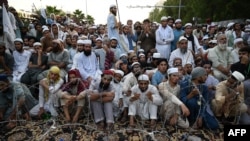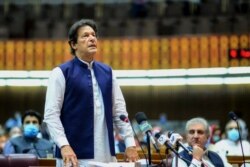Police in southern Pakistan say a prominent Islamic leader and his driver have been shot to death in a suspected sectarian attack.
Maulana Adil Khan, the slain cleric, was returning from a public event Saturday night when gunmen on a motorbike sprayed his car with bullets in a market area in Karachi.
Khan, a scholar from the Sunni Deobandi sect, was running a major Islamic seminary, known as Jamia Farooqia, in the largest Pakistani city of 15 million people.
For years, Karachi has been the scene of political, sectarian and militant violence that has left thousands of people dead. However, officials say years of sustained security operations have improved the situation in the port city, though isolated attacks still take place.
Prime Minister Imran Khan condemned Saturday's slaying of the cleric and blamed rival India for trying to fuel sectarian conflict in Pakistan.
“My govt has known & I have repeatedly stated this on TV, since last 3 months India's attempts to target kill Aalims [scholars] from Sunni & Shia sects to create sectarian conflict across the country,” Khan said via Twitter.
He said that Pakistani security agencies had prevented "a number of such attempts preemptively" in the past few months. "Our ulema [religious scholars] from all sects must ensure people do not fall prey to this nefarious Indian design to destabilize Pakistan,” Khan added.
India has not immediately commented on the allegations.
Link to US
Slain scholar Khan had spent many years in the United States where he set up an Islamic center for young children in Lodi, California, before being arrested and deported in 2005, along with his teenage son.
They both were investigated by U.S. authorities in connection with possible terrorist activity and agreed to be deported in exchange for the government dropping charges that they misrepresented themselves when entering the country.
Sectarian tension
Khan’s assassination comes at a time of increased acrimony between Pakistan’s majority Sunni and minority Shiite Muslims. The tensions stem from the broadcast of a video of a Shiite religious rally last August that showed clerics and participants allegedly making derogatory remarks against historic Islamic figures.
The video angered Sunni Muslims, who have taken to the streets in Karachi and elsewhere in the country to accuse Pakistani Shiite leaders of committing blasphemy.
The intensified rivalry has fueled fears of another round of sectarian violence that in the previous decade killed thousands of people in Pakistan.
A government crackdown on Sunni and Shiite militant groups, however, has resulted in a dramatic decline in the violence in recent years.





